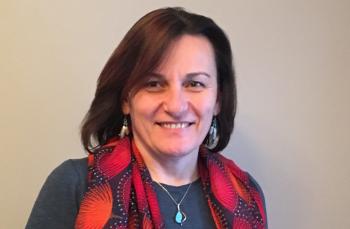Image Caption
Summary
Local Journalism Initiative Reporter
Windspeaker.com
For the first time in 40 years the Ontario Federation of Indigenous Friendship Centres (OFIFC) has a new executive director.
Earlier this year federation officials revealed Sylvia Maracle, who has held the post the past four decades, would be retiring this summer.
And on Monday it was announced that Gertie Mai Muise is serving as the OFIFC’s incoming executive director.
“I think it is a milestone,” Muise said of the fact she will be replacing Maracle after her four-decade career as the OFIFC executive director. “She started it up and she built it.”
Muise, a member of Qalipu Mi’kmaq First Nation of Newfoundland, is no stranger to the OFIFC.
Back in the late 1990s she started what was a 13-year stint with the federation. She served in various program development, policy, training, employment and project management roles.
For the past two years, however, she has been living in St. George’s, Nfld., where she has been operating a consultancy services company with her partner James, focusing on First Nations, Métis and Inuit health transformation, uprooting systemic racism targeting Indigenous peoples and community building.
Prior to heading to her home province a couple of years ago, Muise had served as the CEO for the Indigenous Primary Health Care Council, an organization she helped establish, for almost two years.
Because of her continued work within Indigenous communities, Muise was considered for the OFIFC posting when Maracle’s pending retirement was announced.
“The board was quite interested and I let my name stand,” she said. “We talked about the needs the federation has and I was excited when they offered me the position.”
Because of the COVID-19 pandemic, however, Muise will remain in St. George’s for now and work remotely for the OFIFC.
When it is safer to do so and a large number of employees start returning to offices instead of working remotely, Muise plans to move back to Toronto and work at the OFIFC’s downtown headquarters.
Muise doesn’t believe working remotely for now from another province will provide any significant challenges with her new job.
“I’m accustomed to leading teams, and in difficult times,” she said.
Plus, Muise will still be able to count on Maracle for some direction in the immediate future.
“She’s going to be staying on until late June or early July,” Muise said. “But she will be available for a couple of months after that if need be.”
OFIFC president Jennifer Dockstader is pleased Muise is once again working for the federation.
“Her experience as a staunch advocate of urban Indigenous people is in total keeping of the work we do every day,” Dockstader said. “These energies, passion and experiences will help us continue to build the friendship centre movement today and into the future.”
The OFIFC represents the interests of 29 friendship centres in towns and cities throughout Ontario.
The centres are places where Indigenous people and community members can gather in urban settings to receive culturally based services and connect with one another.
Friendship centres are not-for-profit and charity organizations.
All of the friendship centres in Ontario are independently managed. They offer programming services in areas including Children and Youth, Education and Employment, Justice, Health and Wellness and Homelessness and Housing.
Programming can vary at different centres because at times it is based on geographical locations.
Muise said she is not looking to make any major changes to the OFIFC mandate now that she will be taking over as its executive director.
“They have a 25-year strategic plan,” she said of the federation. “They have their pathway set. I’ll be following their plan and listening to their needs.”
This is the 16th year of the OFIFC’s 25-year plan.
Muise’s career accomplishments include some personal recognition.
In 2017 she received an award for bringing San’yas Indigenous specific anti-racist education to Ontario.
This training, first delivered by the Provincial Health Services Authority of British Columbia, was offered to 20,000 health care professionals in Ontario.
Muise was also recognized in 2019 for this work with a National Community Champion Award.
“I thought it was quite an honour to receive that,” Muise said of her national accolade. “A lot of the work that goes on in communities doesn’t get recognized.”

